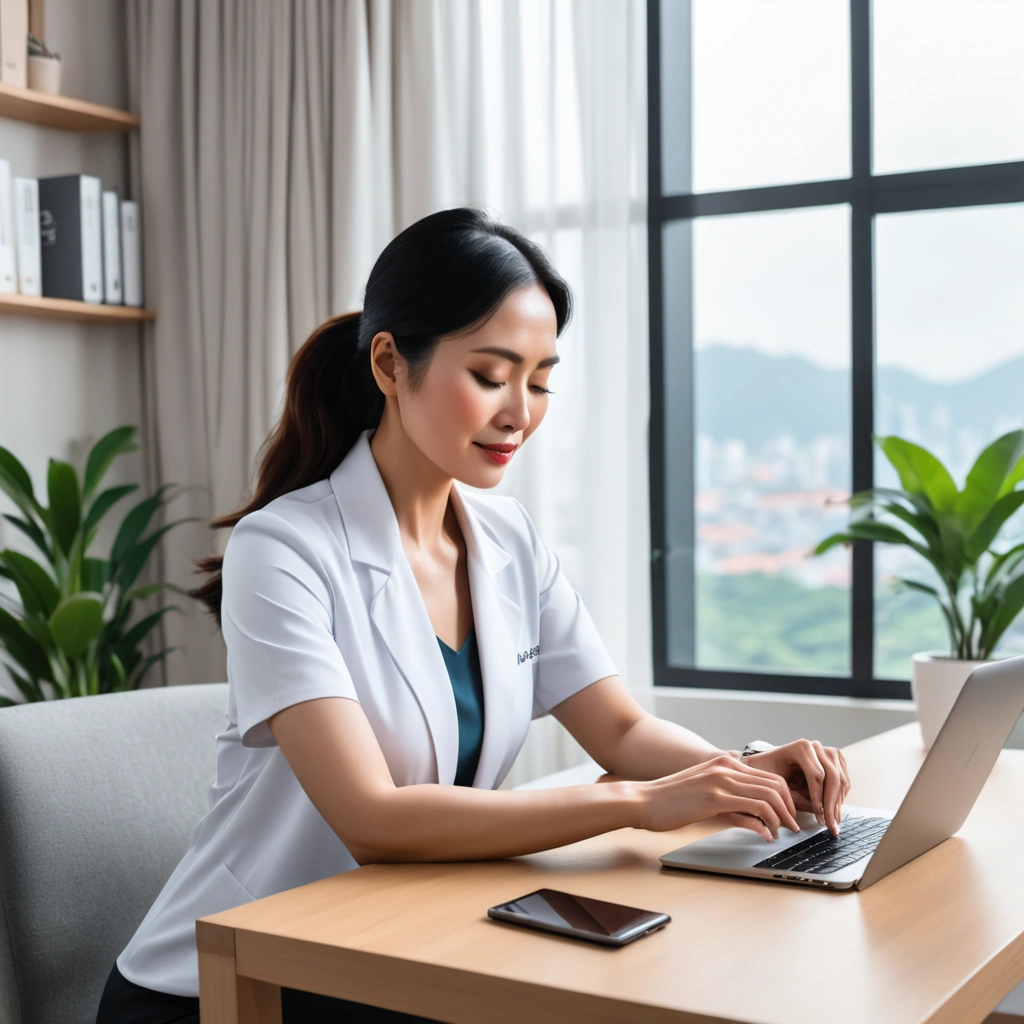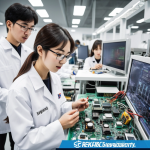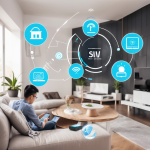AI-Powered Self-Care: A Guide for OFWs to Thrive Abroad (2020-2029)
Introduction: Prioritizing OFW Well-being in the Digital Age
Millions of Filipinos work tirelessly overseas, contributing significantly to the Philippine economy through remittances. However, this dedication often comes at a cost to their own well-being. Away from family and familiar support systems, Overseas Filipino Workers (OFWs) face unique challenges to their physical and mental health. In this decade, 2020-2029, technology offers a lifeline. This guide explores how AI-powered self-care and wellness apps can empower OFWs to proactively manage their health, fostering a more balanced and fulfilling experience abroad.
We will delve into the common health challenges OFWs face, provide a curated list of helpful apps, offer practical integration tips, and address crucial data privacy concerns. This is about putting the power of well-being back in the hands of those who deserve it most. The digital revolution is reshaping healthcare, and for overseas Filipino workers, this translates to unprecedented access to mental health support and resources, regardless of location or time zone. AI wellness apps are emerging as powerful tools, offering personalized interventions and preventative strategies tailored to the unique stressors faced by OFWs.
From AI-powered self-care techniques to mental wellness chatbot companions, these technologies are designed to bridge the gap in access to care and promote holistic OFW health. However, the integration of technology into OFW’s lives requires careful consideration of cultural nuances and individual needs. Self-care for Filipinos abroad is not merely about adopting generic wellness practices; it’s about adapting these practices to fit the specific cultural context and challenges faced by overseas Filipino workers. Many AI wellness apps are now incorporating culturally relevant content and language support, making them more accessible and effective for Filipino workers.
Furthermore, understanding the specific barriers that OFWs face in accessing mental health services, such as stigma and lack of culturally competent providers, is crucial in developing and implementing effective digital health for OFWs solutions. This includes promoting awareness of available resources and addressing concerns about data privacy and security. The potential of AI-powered self-care extends beyond individual well-being, offering opportunities to improve the overall welfare of the overseas Filipino workers community. By leveraging data analytics and machine learning, these apps can identify trends and patterns in OFW mental health, providing valuable insights for policymakers and organizations working to support this population.
This data-driven approach can inform the development of targeted interventions and preventative programs, addressing the root causes of mental health issues among OFWs. Moreover, the use of OFW mental health apps can facilitate peer support and connection, creating virtual communities where Filipinos abroad can share their experiences, offer encouragement, and access valuable resources. By fostering a sense of belonging and social support, these apps can play a vital role in promoting resilience and well-being among overseas Filipino workers.
Understanding the Health Challenges Faced by OFWs
Working abroad presents a unique constellation of stressors impacting OFW health. OFWs frequently experience intense loneliness and social isolation, stemming from separation from loved ones and the often-difficult process of adapting to new cultures and social norms. This isolation can significantly contribute to anxiety and depression, with studies showing higher rates of these conditions among OFWs compared to their counterparts who remain in the Philippines. Furthermore, the digital divide, despite increasing access to technology, can exacerbate feelings of disconnect if reliable and affordable internet access is not consistently available, hindering communication with family and access to online support networks.
This highlights the critical need for accessible and culturally relevant mental health resources tailored to the unique challenges faced by overseas Filipino workers. The demands of overseas work often lead to irregular and unhealthy eating habits, contributing to poor nutrition and weight management issues. Limited access to familiar Filipino cuisine, coupled with the prevalence of fast food and processed options in many host countries, can make it challenging for OFWs to maintain a balanced diet.
This can result in deficiencies in essential nutrients and an increased risk of developing chronic conditions such as diabetes and heart disease. Moreover, many OFWs work long hours in physically demanding jobs with limited opportunities for physical activity, further increasing their vulnerability to these health problems. Promoting access to nutritional guidance and resources, potentially through AI wellness apps offering culturally appropriate meal planning, is essential for supporting Filipino worker wellness. The pressure to remit money home, a significant factor driving overseas employment, can also lead to financial stress, further impacting mental health for OFWs.
The responsibility of supporting family members back home, combined with the pressure to meet financial obligations, can create a constant state of anxiety and worry. This financial strain can also limit OFWs’ ability to prioritize their own health and well-being, as they may be reluctant to spend money on healthcare or self-care activities. AI-powered self-care tools, particularly mental wellness chatbot applications, can offer cost-effective and accessible support for managing stress and improving financial literacy, helping OFWs navigate these challenges.
Addressing these multifaceted challenges requires a holistic approach that integrates technology, culturally sensitive support systems, and proactive self-care strategies, ensuring the well-being of overseas Filipino workers. Beyond mental and physical health, OFWs also face unique occupational health risks depending on their specific industry. Domestic workers, for example, may be exposed to hazardous cleaning chemicals or experience musculoskeletal problems due to repetitive tasks. Construction workers may face risks of accidents and injuries on the job site. Nurses and healthcare workers may experience burnout and stress due to long hours and demanding work environments. Understanding these specific risks and implementing appropriate safety measures is crucial for protecting the health and well-being of OFWs. Digital health for OFWs can play a role here, with apps providing access to safety information, training resources, and even telemedicine consultations with healthcare professionals specializing in occupational health.
AI-Powered Wellness Apps: A Curated List for OFWs
AI-powered apps offer personalized support for various aspects of well-being, presenting a significant opportunity to enhance OFW health. These digital tools provide readily accessible resources for self-care for Filipinos abroad, addressing the unique challenges they face. Here’s a curated list of AI wellness apps tailored for overseas Filipino workers: Mental Health Support: Apps like Woebot and Replika utilize AI-driven chatbots to deliver cognitive behavioral therapy (CBT) techniques and emotional support. These apps are invaluable in helping OFWs manage stress, anxiety, and loneliness through guided conversations and mood tracking.
Sentiment analysis allows the apps to tailor responses to the user’s emotional state, providing a personalized experience that fosters mental wellness. According to a 2023 study by the World Health Organization, access to mental health support through digital platforms can significantly reduce symptoms of depression and anxiety in vulnerable populations, making these apps a crucial resource for OFW mental health. Fitness Tracking: Apps like Fitbit, Google Fit, and Samsung Health leverage AI to personalize fitness goals and track progress, which is vital for maintaining physical health amidst the demanding work environments often experienced by overseas Filipino workers.
These apps monitor activity levels, sleep patterns, and heart rate, providing insights and motivation to stay active. AI algorithms can adjust workout recommendations based on user performance and preferences, ensuring that OFWs receive tailored fitness guidance. The integration of wearable technology with these apps further enhances their effectiveness, allowing for continuous monitoring and real-time feedback. Data from a 2022 report by the International Labour Organization indicates that promoting physical activity among OFWs can lead to increased productivity and reduced healthcare costs.
Nutrition Guidance: Maintaining a healthy diet can be challenging for OFWs due to limited access to familiar foods and demanding work schedules. Apps like MyFitnessPal and Lose It! leverage AI to analyze food intake, provide personalized calorie recommendations, and suggest healthier alternatives, supporting Filipino worker wellness. They can scan barcodes, estimate portion sizes, and offer insights into macronutrient balance. AI-powered image recognition can even identify food items from photos, simplifying the process of tracking meals.
By providing personalized nutritional guidance, these apps empower OFWs to make informed food choices and maintain a balanced diet, contributing to their overall health and well-being. The use of AI in these apps helps to overcome the language barriers that some OFWs may face, as many apps offer multilingual support and visual aids. Sleep Improvement: Quality sleep is essential for both physical and mental health, yet it is often compromised by the demanding work schedules and stressful environments experienced by overseas Filipino workers.
Apps like Sleep Cycle and Calm use AI to analyze sleep patterns and provide personalized recommendations for improving sleep quality, promoting digital health for OFWs. They monitor sleep cycles, identify disturbances, and offer guided meditations and relaxing sounds to promote restful sleep. Some apps use AI to detect snoring and sleep apnea, alerting users to potential health concerns. These AI-powered self-care tools can significantly improve sleep quality, leading to enhanced cognitive function, reduced stress levels, and improved overall well-being for OFWs. Furthermore, the use of mental wellness chatbot features within these apps can provide additional support for managing stress and anxiety, which are common contributors to sleep disturbances.
Practical Tips for Integrating Apps into Daily Routines
Integrating these apps into daily routines requires careful planning, especially considering limited internet access and busy schedules. Download apps and relevant content (like meditation audio) during periods of Wi-Fi availability. Set realistic goals and start small, focusing on one or two areas of improvement. Use app features like reminders and notifications to stay on track. Take advantage of offline features, such as guided meditations or workout routines that don’t require an internet connection. Consider using apps during breaks or commutes to maximize time efficiency.
Prioritize self-care as a non-negotiable part of the daily schedule. To truly maximize the benefits of AI wellness apps for OFW health, it’s crucial to personalize the experience. A recent study by the World Health Organization indicated that tailored digital interventions are significantly more effective in improving mental health for OFWs than generic solutions. Explore the customization options within each app to align with individual needs and preferences. For instance, mental wellness chatbot features often allow users to specify their triggers, coping mechanisms, and preferred communication styles.
This personalization not only enhances engagement but also ensures that the support provided is relevant and effective in addressing the unique challenges faced by overseas Filipino workers. Beyond individual usage, consider leveraging AI-powered self-care apps to foster a sense of community among Filipino worker wellness. Many apps offer features that allow users to connect with others, share experiences, and participate in group challenges. Creating virtual support groups centered around specific interests or challenges can combat feelings of isolation and loneliness, which are common among OFWs.
Furthermore, these platforms can facilitate the sharing of culturally relevant self-care practices, such as traditional Filipino stress-relief techniques or recipes for healthy Filipino dishes. By fostering a sense of connection and shared identity, these apps can contribute to a stronger sense of well-being for Filipinos abroad. Finally, remember that technology is a tool, and its effectiveness depends on consistent and mindful usage. “Digital health for OFWs should complement, not replace, human connection,” advises Dr. Emily Carter, a leading expert in cross-cultural mental health.
Schedule dedicated time for app usage, free from distractions, and treat it as an important appointment with yourself. Regularly evaluate the impact of the app on your well-being and adjust your approach as needed. If an app is not proving helpful, don’t hesitate to explore alternatives. The goal is to find a sustainable and enjoyable way to integrate AI-powered self-care into your life, contributing to your overall health and happiness as an overseas Filipino worker. Explore apps specifically designed to support OFW mental health.
Overcoming Language Barriers and Cultural Differences
Language barriers and cultural differences can pose significant challenges to the effective utilization of AI wellness apps by overseas Filipino workers. While many AI-powered self-care solutions are developed with global audiences in mind, their efficacy can be hampered if they fail to account for the nuances of language and cultural context specific to the OFW experience. Choosing apps that offer multilingual support, including Tagalog or other Philippine languages, is a crucial first step. However, true accessibility goes beyond mere translation.
It requires culturally sensitive design that incorporates familiar idioms, values, and social cues to resonate with the target user, ensuring that the digital health for OFWs feels both relevant and trustworthy. Engage with online communities and forums to share tips and experiences with other OFWs using these apps. Consider seeking guidance from healthcare professionals or counselors who are familiar with the cultural context of OFWs. Remember that self-care is a universal need, but the approach may need to be adapted to individual circumstances and cultural preferences.
Inclusive language is important when discussing these apps. Beyond linguistic accessibility, the cultural relevance of AI wellness apps plays a pivotal role in promoting OFW health and mental wellness. For instance, a mental wellness chatbot designed to alleviate stress and anxiety should incorporate culturally appropriate coping mechanisms and communication styles. This might involve integrating elements of Filipino humor, storytelling, or spiritual beliefs into the chatbot’s responses and guidance. Furthermore, AI-powered self-care tools can be tailored to address specific stressors faced by Filipino worker wellness, such as homesickness, financial worries related to remittances, or concerns about family members back home.
Such culturally attuned design can significantly enhance the user experience and foster a stronger sense of connection and trust, ultimately improving the adoption and effectiveness of these technologies for mental health for OFWs. Moreover, the successful integration of AI wellness apps into the lives of overseas Filipino workers necessitates a community-driven approach. Online forums and social media groups dedicated to OFW mental health apps can serve as valuable platforms for sharing experiences, troubleshooting technical issues, and providing peer support.
These communities can also play a crucial role in identifying culturally specific needs and preferences that can inform the development of more effective and user-friendly AI-powered self-care solutions. By fostering a sense of collective ownership and empowerment, these platforms can help overcome barriers to access and ensure that digital health for OFWs truly serves the needs of this vulnerable population. Leveraging these networks can also help in disseminating information about data privacy and security, ensuring safe app usage among overseas Filipino workers.
Finally, the ethical implications of using AI in mental health for OFWs must be carefully considered. While AI-powered tools can offer personalized support and convenience, they should not replace human interaction and professional guidance. It is crucial to ensure that these apps are used responsibly and ethically, with a focus on protecting user privacy, promoting informed consent, and avoiding potential biases. Collaboration between technology developers, healthcare professionals, and OFW advocacy groups is essential to establish clear guidelines and standards for the development and deployment of AI wellness apps, ensuring that they contribute to the overall well-being of Filipinos abroad without compromising their rights or dignity. The focus should always remain on enhancing, not replacing, the human element in self-care for Filipinos abroad.
Data Privacy and Security: Safe App Usage for OFWs
Data privacy and security are paramount when using health apps, especially given the sensitive nature of personal data and the potential for misuse. Review the app’s privacy policy carefully to understand how your data is collected, used, and shared; pay close attention to clauses regarding data anonymization, third-party access, and data retention periods. Choose apps from reputable developers with a strong track record of data protection, looking for certifications like HIPAA compliance (if applicable) or independent security audits.
Be cautious about sharing sensitive personal information such as medical history or personal struggles with mental health for OFWs. Use strong, unique passwords and enable two-factor authentication when available to prevent unauthorized access to your accounts. Regularly update the app to ensure you have the latest security patches that address known vulnerabilities. Consider using a VPN to encrypt your internet traffic and protect your data from unauthorized access, particularly when using public Wi-Fi networks, a common scenario for overseas Filipino workers.
Beyond basic precautions, OFWs should actively manage app permissions and data-sharing settings. Many AI wellness apps request access to various phone features like location, contacts, or camera. Review these permissions and revoke access where it’s not strictly necessary for the app’s core functionality. For instance, a mental wellness chatbot might not need access to your contacts. Explore built-in privacy features within your phone’s operating system to limit ad tracking and data collection across apps. Be wary of apps that request excessive permissions or collect data unrelated to their stated purpose, as this could indicate malicious intent.
Remember, proactive management of app permissions is crucial for maintaining OFW health and protecting your digital privacy. The long-term implications of data privacy extend to the ethical considerations surrounding AI-powered self-care. While these apps offer immense potential for improving mental health for OFWs and promoting Filipino worker wellness, the algorithms that power them are trained on vast datasets of user information. Bias in these datasets can lead to discriminatory or unfair outcomes, potentially exacerbating existing inequalities.
It’s important to be aware of these potential biases and to advocate for transparency and accountability in AI development. Support initiatives that promote ethical AI practices and ensure that these technologies are used responsibly to benefit all members of the OFW community. The iPhone owner’s guide to living off the app grid is a timely resource for increased relevance. By taking these precautions, OFWs can enjoy the benefits of AI-powered self-care apps while safeguarding their privacy.


